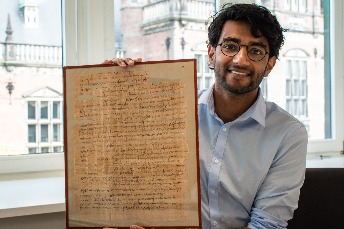Matrimonial law and identity formation in a culturally diverse ancient world

Ruwan van der Iest defends his thesis on Judean cultural identity within a multicultural society
On Monday 23 January, the PhD ceremony of PhD student Ruwan van der Iest will be held. He will defend his dissertation titled A study on Judean cultural identity in Egypt during the fifth century BCE: ‘Not only will the conclusions of my thesis contribute to a more profound understanding of Judean cultural identity during the fifth century BCE, but I will also demonstrate that, in addition to religion, matrimonial law was an integral part of this identity.’
Globalization in the ancient world
Why did Ruwan choose to focus on the fifth century BCE? ‘It was a period in which the ancient world was more involved in the process of globalization than ever before. The rise of the Achaemenid Empire caused multiple populations to move away, with individuals migrating to new regions within the empire. One of those communities was the Judean community of Elephantine, who settled on an island in the Nile River in southern Egypt. In my thesis, I explore how the settling of this community in a culturally diverse context influenced the development of the Judean community's cultural identity.’
Judean matrimonial documents
In his research, Ruwan approaches this issue from the perspective of the legal tradition underlying the Aramaic papyrus texts that were discovered on Elephantine Island in the late 19th and early 20th century: ‘Based on the contents of Judean matrimonial property arrangements, I demonstrate that Judeans not only adapted themselves to the legal practices of their contractual partners, but also continued to use elements of a distinct Judean legal tradition in the context of matrimonial law.’
Identity issues
After finishing his Master’s degree in Classics and Ancient Civilizations at Leiden University, Ruwan van der Iest completed a Research Master’s degree at the Faculty of Theology and Religious Studies of the University of Groningen, specializing in Old Testament and Qumran studies. ‘I have always had a special interest in identity issues and the way in which we, as academics, try to define and study the identity of ancient civilizations. During one of my course units in Leiden, I was introduced to the Aramaic papyri from Elephantine Island. I notably studied Judean matrimonial documents and matrimonial law, which is why I chose to use these documents for my research on the identity of this Judean community. In that way, I was able to combine my interest in the identity of ancient civilizations with my interest in legal history.'
Relevance to identity formation issues of modern communities
‘My research shows how members of a historical community within a multicultural society deal with cultural diversity. On the basis of legal documents, I have been able to show how the members of this community adapt to new customs, but also hold on to their own customs in order to retain their own cultural identity. In the case of the Judean community of Elephantine Island, I found marriage law to be an essential part of Judean cultural identity. My conclusion may also be relevant to identity formation issues of modern communities, and the influence of globalization and cultural interaction on this process. Just like during the Persian period, we are currently living in a time where different cultures are in constant contact with each other,’ says Ruwan.
Atmospheric, small-scale Faculty
Ruwan explains why he enjoyed his time at the Faculty of Theology and Religious Studies so much: ‘It is a small-scale faculty, where almost everyone knows each other. Therefore, as a student or PhD student, you always have to be well prepared for lectures or discussions… But most of all: this creates a very friendly atmosphere. There is a lot of contact and exchange of knowledge between the students. For example, Master's students are very willing to help and tutor Bachelor's students. Everyone is approachable, everybody is seen. And you really feel appreciated when you’re committed to something.'
Teacher at our Faculty
After his PhD, Ruwan would love to continue working as a lecturer at our Faculty: 'I am currently working as a lecturer in Greek, and before that I also gave lectures on Hebrew as well as guest lectures on the history of Egypt and papyrology. After obtaining my PhD, I’d also like to contribute to the in-depth lectures at the UG, such as the lectures on Old and New Testament exegesis. I’d love to continue combining my work at the UG with my job at a secondary school, where I teach Greek and Latin language and culture.'
PhD ceremony
On Monday 23 January, Ruwan van der Iest will defend his PhD thesis during a PhD ceremony in the presence of his supervisor Prof. Mladen Popovic, Professor of Old Testament and Ancient Judaism (with special attention for Qumran and the Dead Sea Scrolls) as well as Dean of the Faculty of Theology and Religious Studies of the University of Groningen, and joint supervisor Prof. Wout van Bekkum, emeritus professor of Middle Eastern Studies at the University of Groningen.
When: Monday 23 January 2023
Starts: 4.15 p.m.
Where: Academy Building
| Last modified: | 07 September 2023 12.32 p.m. |
More news
-
20 March 2024
Hanneke Muthert appointed professor Psychology of Religion
Hanneke Muthert appointed professor Psychology of Religion
-
05 March 2024
PThU en RUG zetten samenwerking in bachelor Theologie in Groningen voort
De Rijksuniversiteit Groningen (RUG) en Protestantste Theologische Universiteit (PThU) zetten hun samenwerking in de bachelor theologie in Groningen voort, ook na de verhuizing van de PThU naar Utrecht in 2024.
-
06 February 2024
Gaming: only the benefits of religion but not the drawbacks
Lars de Wildt researches the similarities between gaming and religion. In the article, he discusses factors such as music, social community and aesthetics.
